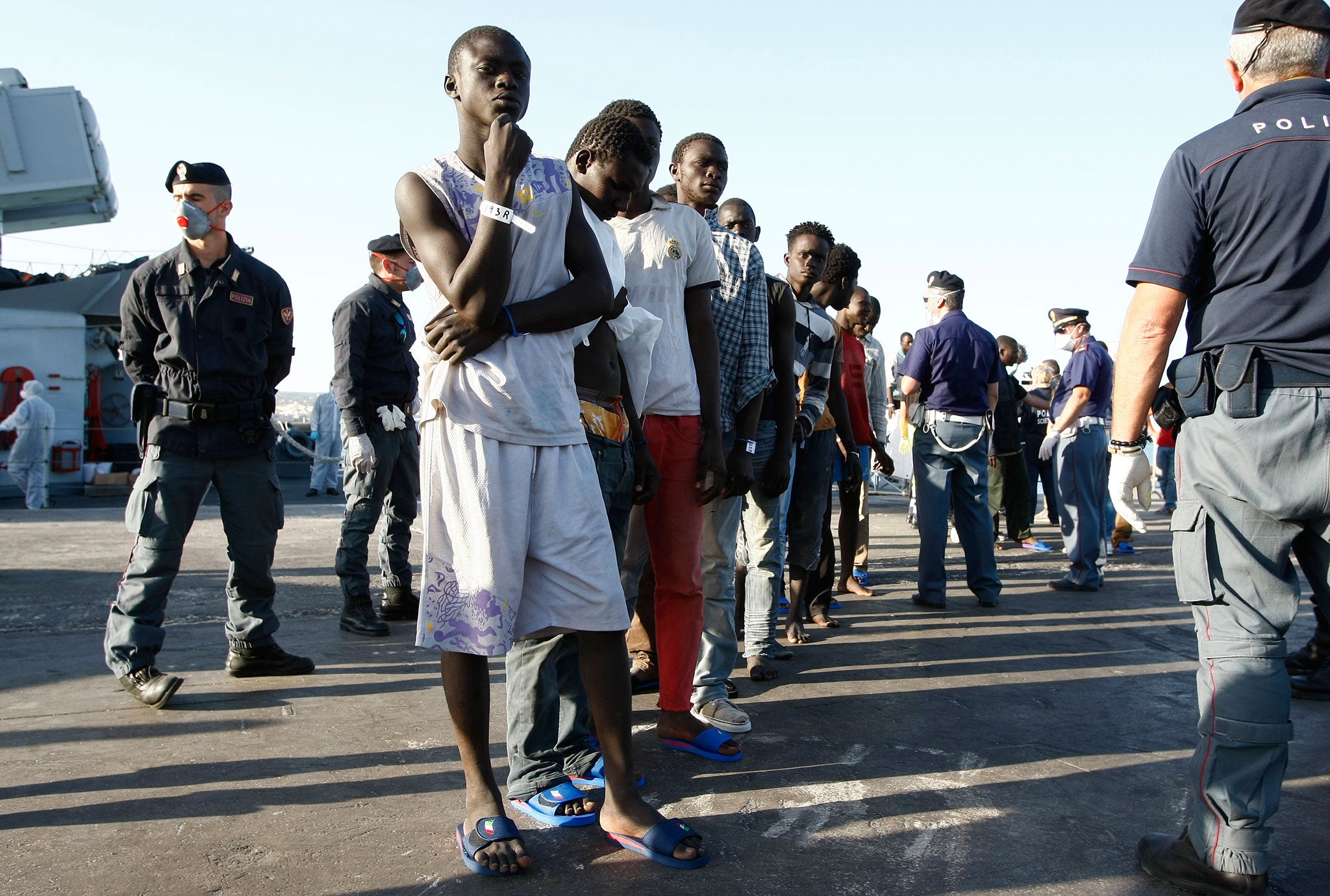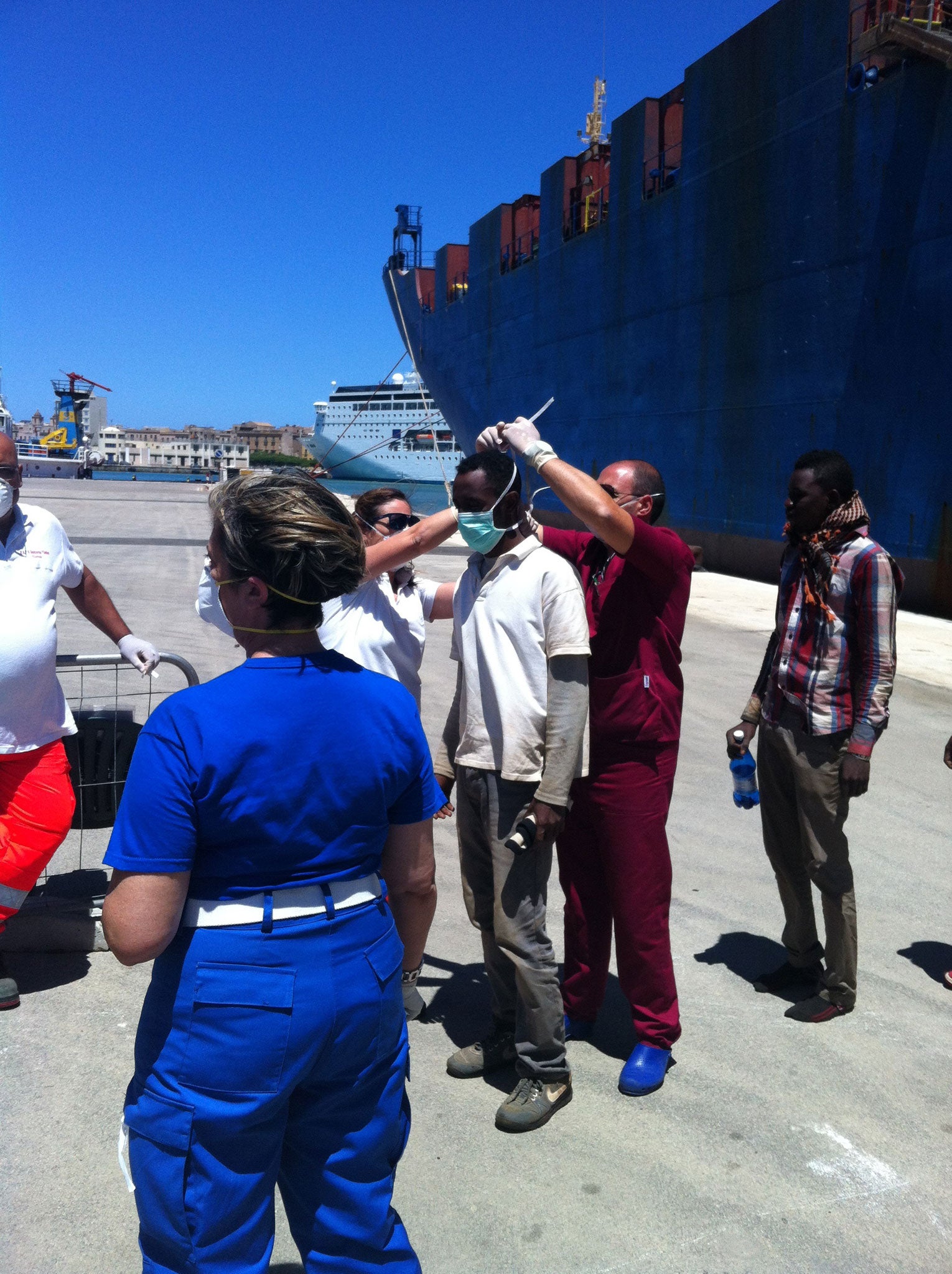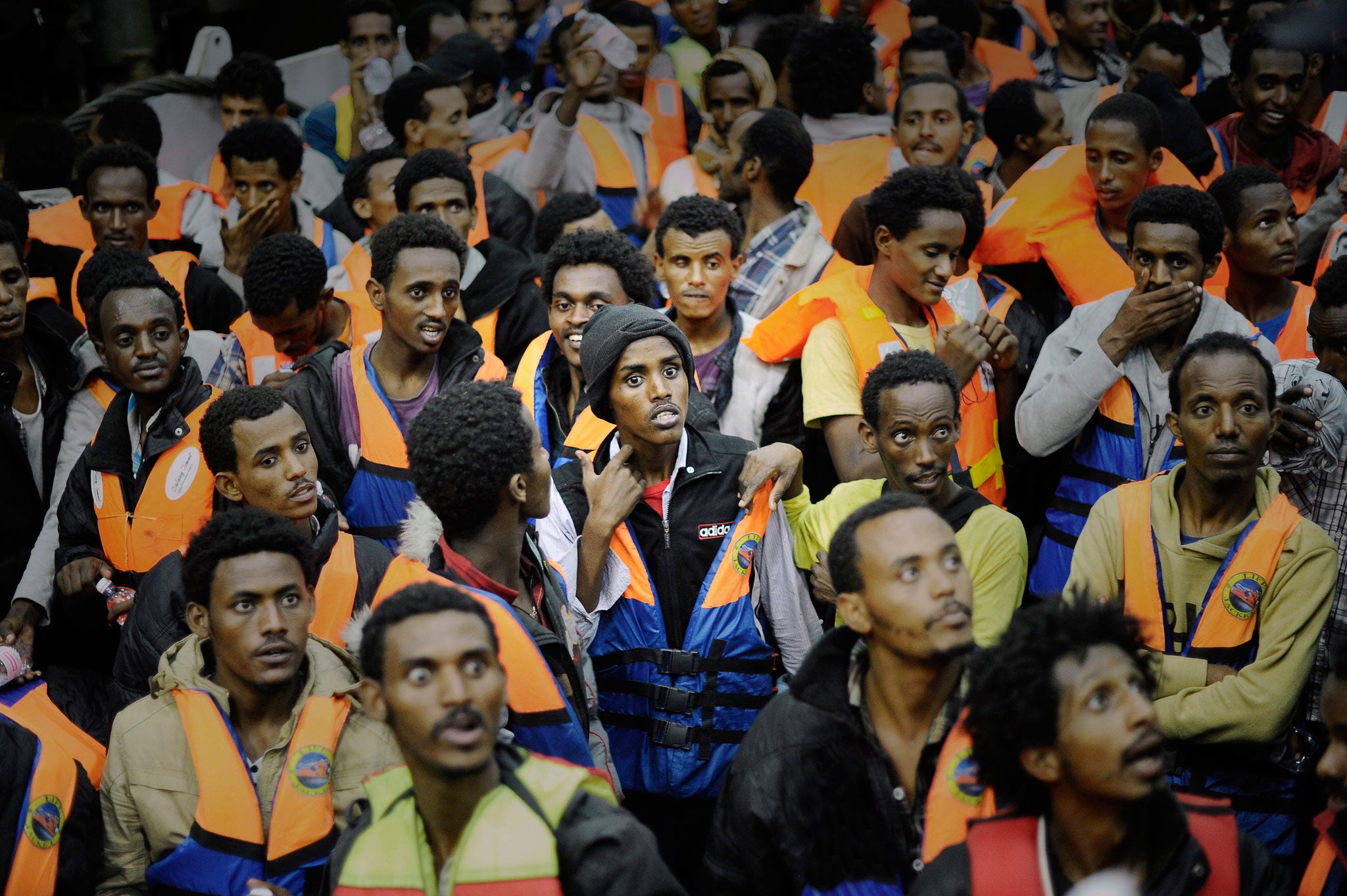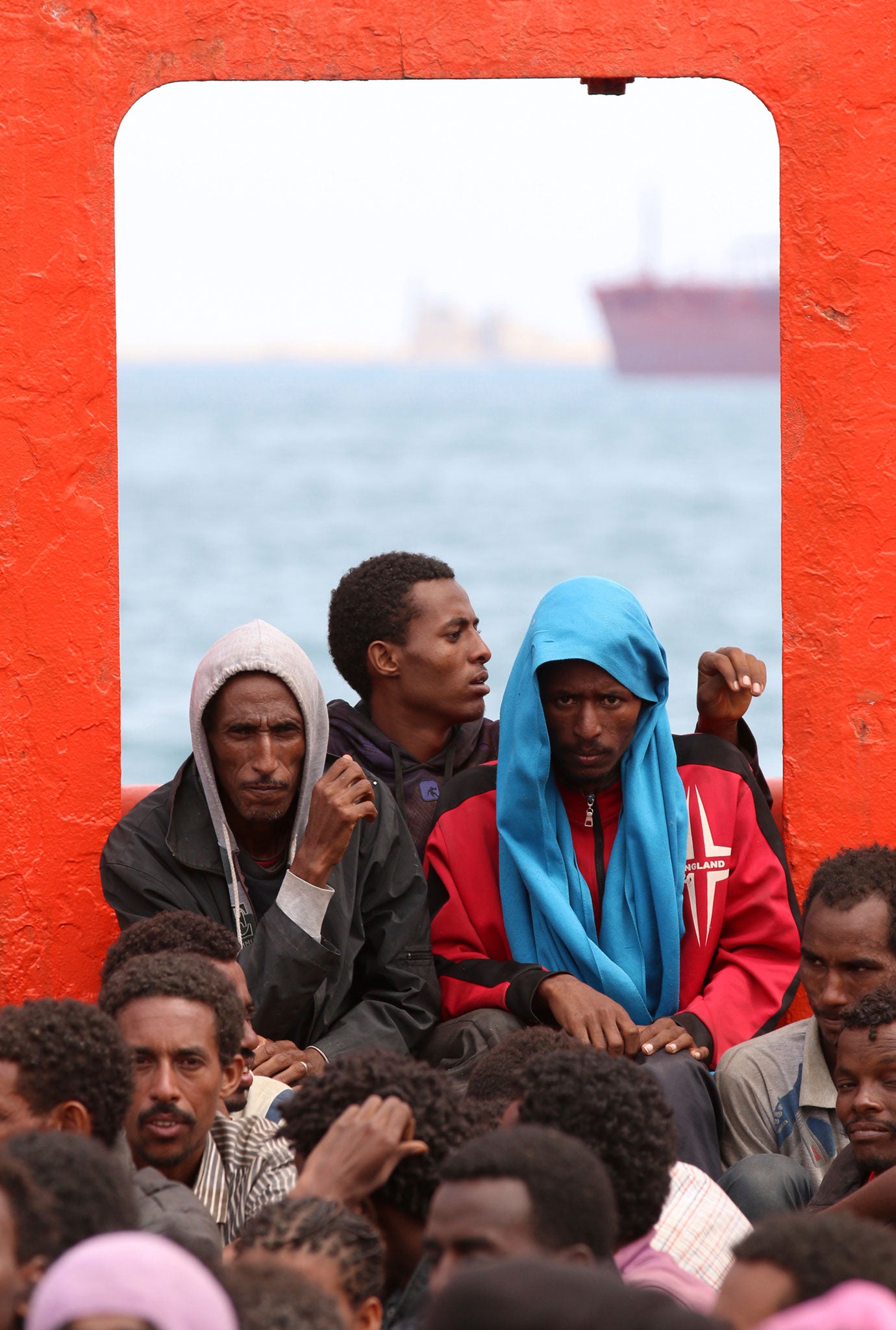What happens to African migrants once they land in Italy during the summer?
August in southern Italy is known darkly as 'boating season' - the peak period for migrants arriving in Sicily at the end of an often epic journey through Africa. Memphis Barker follows their trail through southern Europe

Your support helps us to tell the story
From reproductive rights to climate change to Big Tech, The Independent is on the ground when the story is developing. Whether it's investigating the financials of Elon Musk's pro-Trump PAC or producing our latest documentary, 'The A Word', which shines a light on the American women fighting for reproductive rights, we know how important it is to parse out the facts from the messaging.
At such a critical moment in US history, we need reporters on the ground. Your donation allows us to keep sending journalists to speak to both sides of the story.
The Independent is trusted by Americans across the entire political spectrum. And unlike many other quality news outlets, we choose not to lock Americans out of our reporting and analysis with paywalls. We believe quality journalism should be available to everyone, paid for by those who can afford it.
Your support makes all the difference.We look at them. They look at us. Nobody waves. On the deck of the Tichy, a 150m cargo ship just pulling into port, stand dozens of migrants. Some of them lean on the railings and peer over the side. It is a hot July lunchtime in the Sicilian port of Trapani, and below, on the broiling tarmac, officials wait in uniforms of every colour of the administrative rainbow; nurses in maroon, coastguards and doctors in white, police in navy, and civil immigration services in grey. A policeman to my left whispers, "these ones are from Africa, they're dark". The gangplank is lowered and touches ground.
Tentatively, in groups of five, migrants edge their way down. The moment they come ashore everything happens fast. One nurse shakes the first man's wrist from his sleeve and attaches a wristband. Another ties a surgical mask over his face. Next, someone shines a torch into his eyes and ears, before waving the man behind forward. So the process goes – through a human chain of first-aid workers – until the Tichy has cleared all of its 184 passengers and can return to whatever business it had before it ran into a boat of Senegalese young men adrift in the middle of the Mediterranean.
Nobody is hurt, it seems, or at least they show no more obvious signs of trauma than torn, dirty clothes and tired expressions. The cost of a 'voyage of hope' can be far higher. Eight other ships had already landed in Sicily this weekend, bringing with them a total of 5,000 migrants, and yet another barrage of headlines in the Italian press about an "invasion". At least 30 passengers did not live to see land. The mayor of another port town, Pozzallo, was expected to take care of the bodies but said he had nowhere to store them: all the refrigerators in the morgue were full.
Tales like these still shock Italians, but they no longer surprise. The drowning of 360 voyagers, mainly Eritrean, in October led to the creation of a naval rescue system, Mare Nostrum, that has escorted around 100,000 sea-borne migrants into Italy so far in 2014 – many more than reached the country last year, and the highest level on record. Summer is somewhat darkly known as 'boating season'. In July, television cameras showed the bodies of 40 Africans being winched out of a ship, limp, after the human smugglers in charge of their transit had shot some of them, and forced others to stay below decks, inhaling the fumes of a lethal gas leak.
The Tichy's passengers – sat on rows of plastic chairs laid out under an awning – do not talk much. Volunteers pass out boxes of new trainers. A few hands go up and people start to call out foot-sizes, in French or English, "Forty-two", "Quarante-six", "Sir!". Also given out is lunch in brown paper bags: biscuits, an apple, orange juice and water. Babacar, speaking in French, says he's here to study the language and get work. They left from Tripoli in Libya and have been at sea for four days.
Up until 2011, when Silvio Berlusconi was Prime Minister, migrant-loaded ships leaving from Libya were, wherever possible, turned back. The government of Matteo Renzi has raised a more humanitarian flag. In Trapani, police and immigration services wait behind a barrier. First everyone gets a moment to rest, and their health check. "The most pressing concern," says the town's chief of police, "is to care for human lives."
What comes next, however, is the problem convulsing Italy, a country already in the grip of a grinding economic slowdown.

The mayor of Trapani strides down to the pier to give a press conference. Four new reception centres have been opened, on top of the current 28, to host some of the Tichy's passengers. He hopes that, to ease the burden on his town, 300 from earlier boats will shortly be taken by bus up to Venice. (Several hotels, a few gyms and an old person's home have all already been set aside for migrants.) "Please," he asks the journalists, "can you make a note that it is not my administration placing immigrants in churches. We have nothing to do with that."
Then he leaves, and several hours later, the last of the buses carrying passengers from the Tichy departs the harbour. One is called 'Siberian Autoservices', and has not removed its white tissue seat covers.
Where the men from the Tichy end up – and the ship contained only males – depends on the progress of their interview with immigration. Life can go one of two ways.
Anybody over the age of 18, without a work-permit, family connection, or history of political persecution, is dubbed an 'irregular migrant'. They face being held in a detention centre until an expulsion order comes through. If Babacar told the same story to the interviewer that he related to me, seemingly so full of relief, that would likely be his fate.
The other path is asylum. 'Refugee' status is granted only to those men and women who can prove they risked persecution or death in the home they left behind. Tasteless though it is, if you put together a leader-board of civilian suffering around Africa and the Middle East, Senegal would not rank too highly. Most of those who emigrate do so because the economy offers few opportunities to young people; in Senegalese pop songs the migrant is celebrated as a modern hero, a risk-taker in search of a better life. Border agents will deal with more harrowing cases. War and bloodshed have chased 2.8 million Syrians out of their homes; it is a similar story in Afghanistan, Iraq, the Central African Republic and Libya. Men who do not join the exodus from Eritrea face unlimited military service.
If immigration officials believe that your asylum claim is genuine, you will be placed in a SPRAR (Protection System for Asylum Seekers and Refugees), or if there's no space, a more spartan CARA (Accommodation Centre for Asylum Seekers), where you can stay until your case goes before the Commission. There, a panel will decide on whether or not to usher you into Italian life. Legal aid is offered by some NGOs to help you prepare.
'I won't read it for you," says Angela Lupo, a legal consultant for the Italian Council for Refugees (CIR), as she sits with a cigarette in hand and her legs crossed on a low, cushioned bench. We are in the corridor on the way up to her office. Shareef, a skinny Egyptian boy, has tumbled in to see her. In his hand is a piece of paper that apparently contains the date of his asylum Commission hearing, but he is struggling to decipher it.

Lupo, a petite figure in a smart, fleur-de-lis patterned skirt, looks the other way. "You read it." Shareef haltingly spells out a date. "There," says Lupo, "you have 10 days to go." The Egyptian mutters a thank you, in Italian, and hunches away to use the photocopier.
"He says he's a minor," Lupo tells me in a conspiratorial tone. The Commission often takes it on trust, she adds, so there's a fair chance his request will be successful. Where Lupo works, in Catania, Sicily's second city, they don't use pulse tests – a procedure which gives an accurate indication of age. A deported Egyptian she knew returned to Italy months later and pitched himself to the authorities as under-18. He was allowed to stay.
Lupo's caseload has mushroomed recently. In the whole of 2013 she dealt with 429 asylum-seekers; explaining their rights, going through paperwork even, in preparation for the Commission hearing, acting out role-plays. So far this year the total already stands close to 400. In her office, she scrolls in mock horror down a spreadsheet that names every one. The system has never been under such strain, and every once in a while Lupo pulls up mid-sentence, to pinch her forehead. "I'm getting a headache."
With refugee status so much more appealing than prison, or life in the shadows, fraud infiltrates the asylum system with all the corrosiveness of sea-water. Given that an economic migrant may be just as needy and hungry as the political refugee they imitate, the subject isn't one that aid organisations like to mention.
Yet in 2013, 30 per cent of asylum requests were rejected, and Lupo, whose job it is to make sure the system serves the right people, wearily reels off the preferred fictions by nation. "Nigerians will say they are a Christian who wants to marry a Muslim, or they're homosexual, or they're fleeing police brutality." The day before we met she was brought in to explain to a group of Gambians what an asylum request entailed. They said they were here for work. When she explained they would not get permission, they asked her to invent a story for them. She knows lawyers who would, for a fee.
Other groups enter Italy with an intricate knowledge of what awaits, in particular, says Lupo, the Syrians. Though a number of ships with Syrians on board have landed in Catania this year, not even a handful have made their presence known to the authorities. In theory, EU law requires asylum-seekers to seek asylum in whichever country they first land. But the Italian asylum system is slow, overcrowded and hobbled by a diet of country-wide fiscal austerity. Drawn by the smoother, more generous process in countries like Germany and Sweden, the Syrians – wealthier and better educated than most refugees – look to remain undetected and move north. The New York Times reported earlier this year that, when asked to give a fingerprint on the docks, Syrians clenched their fists. No ID, no trace of their presence. Many officials simply look the other way and let them pass through, up to Milan and beyond, says Lupo. "I knew a Syrian boy last year, about 22," she says, "he made me so mad. He said he would rather die in the sea than live in Italy."
Back in the corridor, refugees – or would-be refugees – pass, and Lupo puts each at ease with a quip. She has done the job for more than a decade and would not swap it. Time has weathered some initial naïvety, however. "When you start," she says, "you have this vision of anti-racism, of the poor foreigner, always desperate. With the years passing you realise that, as everyone is equal, there are also those among the foreigners who behave badly. And so you are more objective, you become more objective."
The CARA Mineo – an hour's drive from Catania – is one of Italy's largest asylum-seeker reception centres. Official capacity is set at 2,000, but behind its fence double that number currently inhabit its blocks of apartments. Protests have spilled out. Stones were thrown over the fence at police cars in October, others crowded out and blocked the state road into Catania.

By law, asylum-seekers can be held for 35 days in a CARA. In reality, the average stay is closer to a year. For Pizzarotti, the company that owns the CARA Mineo, this isn't the worst of news. The Italian state pays the organisation €34.60 per day, per immigrant in rent – close to €50 million annually. "It is a big business," sighs Lupo.
Men and women who live in any Italian CARA are permitted to leave during the day, but, if they applied for asylum only after trying to avoid the law, they are obliged to stay at night. With the majority in the Mineo falling into this category, and the centre itself so far out of Catania, few venture into town.
But on the main drag, the Corso Sicilia, which is bookended by a Roman ruin at one end and a decrepit bus station at the other, I meet Adama Kuyateh. The 17-year-old is hurrying back to the more central CARA for minors, a bright blue cap on his head and a large canvas tucked under his arm. He arrived three months ago by boat. A friend died on the same crossing. He has been on the move, he says, for more time than he can remember. "I went from Gambia to Senegal, Senegal to Mali, Mali to Burkina Faso, Burkina Faso to Niger, Niger to Libya. Libya was the worst. The worst I have ever seen in my life."
An estimated half a million migrants are waiting on the coasts of Libya for a boat into Europe. The country has, meanwhile, collapsed into violence, the rule of law close to evaporated. Kuyateh was held in prison. He doesn't want to talk about it. A report compiled by Human Rights Watch documented widespread abuse.
Being rescued at sea was a blessing. "Everyone attended us professionally and was so kind," says Kuyatah. He has established a lattice-work of friendships at CARA, and is trying to get hold of papers that would allow him to stay, and work, in the country. In the meantime he can paint – the centre having lent him some of the necessary materials. He shows me a snapshot on his phone of one poster which outlines a black hand, reaching plaintively out of the sea.
It is only when Kuyateh leaves the CARA that difficulties arise. "The only problem here is racism," he says, > then turns to me. "I am a Gambian. If you come to Gambia, and I say to you, hey you there, you white, fuck you! You will feel embarrassed." Friends have got into fights with locals. A car pulled up while they were watching the World Cup in a bar; someone pulled down the window and told them to go home. A chase ensued.

To the outside observer, Italy has appeared to slide into the backwaters of European intolerance over the past two decades. In the 1980s, left-wing governments worried more about protecting incomers from discrimination than keeping them out. As the numbers grew, however, and disorder came to city-centres, some of the Italian simpatia curdled into hatred. In its most public spheres, football and politics, Italy seems unable to clamp down on the kind of bigotry last seen (openly) in Britain in the 1970s.
Throughout his nine-year, on-and-off premiership, Berlusconi displayed a cheerful backwardness – which peaked, perhaps, with a 2008 witticism about the "suntan" of Barack Obama. Less cheerful is the Northern League, Italy's far-right, anti-immigrant party. When, in 2013, Cécile Kyenge was appointed the first black minister in the country, the League's MEP jibed: "She would make a good cleaner, not a minister". The party has sought to capitalise on anger at apparently uncontrollable immigration. A few months ago, a Pew survey suggested that 80 per cent of Italians want fewer immigrants in the country; nevertheless, in May's EU election, the League's leaders corralled just 6 per cent of the vote. "There is racism, but not all of Italy is racist," was the diplomatic view of Father Mussie Zerai, a monk of Eritrean descent whose work for migrants has seen him elevated to saviour-like status in his home country.
Two weeks before I visited Catania, the local wing of Forza Nuova, a 'militant' far-right group, held a demonstration in the city. It was publicised on their website with a picture of a bloodied pick-axe, dropped on an Italian flag, next to the slogan 'Immigration kills. Go home Cécile Kyenge'. Videos show the white-uniformed group, in a crowd of around 100, marching under banners that carry slogans such as 'For Italy, blood and culture', and suggest, in their bold black-and-red design, that someone has spent a little too much time admiring Nazi regalia.
"Laws here mean that you can't talk about immigration unless it's in a veiled manner," says Guiseppe Bonnano Conti, the leader of Catania's Forza Nuova, as we walk down the Corso Sicilia. He's referring to the Mancino Law, which forbids Nazi-fascist hate-speech. For the most part, Conti – a grey-haired, goateed 50-year-old, whose blue Kappa polo shirt strains over a paunch – bats away suggestions that skin colour lies at the core of his organisation. "We don't hate the blacks any more than the yellows," he says. "We just want everyone to be OK in their own country."
Conti, who is a precious-metals dealer, speaks more freely about economic matters. He disputes the idea that anything more than a sliver of the newcomers are refugees; the overwhelming majority, he says, are drawn by the mirage of employment. Mare Nostrum, which costs around €9m a month to run, is simply a criminal endeavour, he says: "They spend already €100 million, €150m, when Italian people are killing themselves because of economic problems... these criminals take our money through taxes and they use it to help immigrants. They're destroying our country."
Nationalists like Conti may exaggerate, but the financial burden is no myth. Some economists believe that Italy needs more migrant labour than it currently uses, to support an ageing population. But the rescue and reception of hundreds of thousands of foreigners is, before any work can possibly be done, expensive – roughly €200m a year. And whether war or wealth pushes people to step into a rickety smuggler's boat, those forces are not likely to diminish anytime in the near future.
Prime Minister Matteo Renzi had hoped that Italy's time as head of the EU, which started in July, would bring more funds from Europe's coffers for Mare Nostrum, at least. So far none has arrived. With the likes of Nigel Farage and Marine Le Pen in their wing mirrors, European leaders are unwilling to do anything that could be painted as laying out the red carpet for immigrants. So Italy – the frontline of Europe – is compelled by basic humanity, as well as EU law, to host what the Economist called the "flotsam of a wrecked world" – and left to pick up the tab, too.
On a Friday evening in the church of Santa Chiara, not far from Catania's lava-stone cathedral, two young men stand behind pulpits set at either side of the altar. The church is small and ornate. Brought by bus from the CARA Mineo, some 200 hundred young men and women fill the pews. Kuyateh is among them, sitting near the back.
First the Italian boy on the left starts to read, then the Gambian on the right.
"Armia Walid Wadie Abdelsayed."
"Moharam Walid."
They are intoning the names of those who died at sea.
"Gaballa Mohamed Hamam Abdelgawady."
"Bahaleldin Golai Ghat Rashuan."
The reading lasts for 10 minutes. Behind the two boys, leaning against the altar, is a cross covered in fishing net. Heads are bowed and someone sobs. Emiliano Abramo, the leader of this cross-community youth group, plays a recording of the Pope at Lampedusa: "In this world of globalisation we have fallen into a globalisation of indifference," booms out the voice of Francis. "Forgive us our indifference towards so many brothers and sisters."
When the service is finished, 20 or so young men from the CARA stand up and start to sing. The rhythm is an African one, the words roll and roll, the sound lifting towards the ceiling, filling the air. The singers' faces turn upwards and nobody seems to mind the white people filming on camera-phones. One voice breaks out of the chorus to lead and flit around the edges. It is one of the most beautiful sounds that I have ever heard.
"First I wasn't happy," says Philip, the drummer, later that evening. "I had nobody. Now I have a family, this family took us in."
Over the next fortnight, several more ships made landfall in Italy, thousands more migrants took their first steps in Europe, and, in CARAS, SPRARs and expulsion centres around Sicily, hundreds of new arrivals were shown to somewhere they could sleep.
Some names have been changed
Join our commenting forum
Join thought-provoking conversations, follow other Independent readers and see their replies
Comments